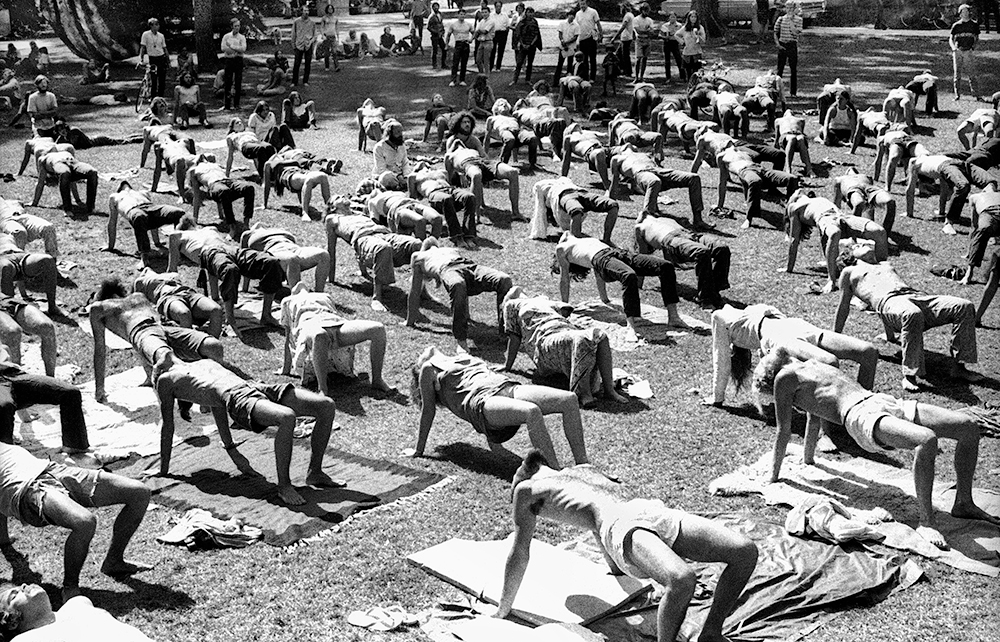As any book about the rise of that most nebulous idea ‘wellness’, should, James Riley’s Well Beings begins with Gwyneth Paltrow, purveyor of ‘This Smells Like My Vagina’ candles, ‘Metabolism-Boosting Super-powder’ and nostrums about mindfulness and ‘self-care’ – for which read self-indulgence. In 2019 Paltrow’s company Goop chartered a luxury liner for a ‘Goop at Sea’ extravaganza, at which attendees were invited to spend $4,200 for the ‘basic’ cruise and a suite at the ship’s onboard spa, and a further $750 for the event itself, the highlight of which would be an appearance by the high priestess of wellness herself.
Goop at Sea was cancelled due to Covid. But it did eventually take to the seas in 2021 – an anticlimactic affair, featuring a ‘low-impact fitness class’ and an ‘intuition seminar’ hosted by the ‘Goop-approved clairvoyant’ Deganit Nuur. Paltrow herself did not attend, and the Goop social media feed conspicuously avoided any reports on the cruise, concentrating instead on upcoming health events, pop ups and high-end product launches. It was ‘social media doing what it does best’, Riley writes – ‘consigning the present to the past and overloading the future with promises yet to be delivered’.
At Synanon, clients were expected to shave off their hair, wear identical white overalls and be ‘given hell’
As ‘the market leader in the contemporary wellness industry’, Goop is reportedly worth some $250 million. And Well Beings is very much on the money in every sense of the term. Riley’s previous book, The Bad Trip: Dark Omens, New World and the End of the Sixties, was a smart, acerbic look at the dark side of 1960s counter-culture. This onepicks up the thread to deal with the cultural shift in the 1970s from the political to the personal, examining how counter-cultural projects of the 1960s, from communes to radical politics to psychedelics, gave rise to ‘Me Generation’ ideas and a growing interest in eastern spiritual teachings and alternative therapies. It culminated in what Riley calls the ‘commodified approach to wellness’ – a term so broad it can be applied to everything from public health policy to yoga to Arouse Me Libido Elixir (‘tastes like cherries’). Goop again.
Beginning with the post-war shift in government policy in Britain away from a singular, medicalised focus on ‘illness’ to a more broad-ranging idea of ‘well being’ – physical, mental and social – as a definition of health, Riley sets off on his enquiry. This encompasses everything from communal living in the late 1960s, to the Black Panthers and the ubiquity of private swimming pools in California, to Michel Houellebecq, Invasion of the Body Snatchers and the utopian dreams of Rajneesh, the ‘93 Rolls- Royces guru’.
Much of the book hinges on the rise of the Human Potential Movement during the ‘Me’ decade and ‘the culture of narcissism’ (as Tom Wolfe and Christopher Lasch saw the 1970s). The crucible of this was the Esalen Institute in California, ‘a Cape Canaveral for inner space’, where various therapies (Gestalt, Rolfing, encounter groups) were explored between dips in the nearby hot springs. The ethos was best defined by one of the resident gurus, the psychologist Abraham Maslow, as ‘a desire to become more than what one is, to become everything that one is capable of becoming’. As a writer for Holiday magazine, visiting in 1968, put it: ‘I got in touch with my body this winter, I made contact with my SELF – and it was the best trip I ever had.’ Wolfe wrote that the various therapies available at Esalen offered those attending the opportunity to focus their attention on ‘the most fascinating subject on Earth: Me’. Graffiti scrawled at the entrance put it more bluntly: ‘Jive shit for rich white folks.’
Esalen was the pioneer for a growing number of self-help gurus and organisations that became thriving commercial concerns. Foremost among them was ‘est’, promoted by – too good to be true – a former car and encyclopaedia salesman called Werner Erhard. He was born John Paul Rosenberg, but took his new name after reading articles in Esquire about the physicist Werner Heisenberg and the German chancellor Ludwig Erhard. Est (Latin for ‘he/she/it is’ and acronym for Erhard Seminars Training) involved attendees signing up to spend their weekends in hotel conference rooms being starved of sleep and longing for the privilege of a bathroom break while being yelled at by ‘coaches’. At Synanon, a ‘residential therapeutic community’ founded by a former member of Alcoholics Anonymous, Charles ‘Chuck’ Dederich, clients were expected to shave off their hair, wear identical white overalls and listen with rapt attention to recorded missives from Dederich, and ‘given hell’ in protracted therapy sessions called ‘the Game’.
These encounter groups – ‘lube jobs for the personality’, as Wolfe described them – more often resembled theatres of tyranny, involving psychological, and sometimes physical, self-flagellation that would have made a medieval penitent blush. They reached their nadir at the Rajneesh ashram in Poona, which conjoined human potential therapies with eastern spiritual teachings, and where the meetings often ended in sexual free-for-alls from which participants would emerge with broken limbs and mental breakdowns.
Riley goes into some detail discussing The Serial (1977), a satire by Cyra McFadden about the wealthy area of Marin County where any number of practices blossomed, including est, bio-energetics, Reichian therapy and ‘guided fantasy’. McFadden’s send-up resulted in threats, with attacks on her home and her car tyres slashed, presumably by people who had not been paying attention at their consciousness-raising classes.
The frenetic pursuit of ‘true self’ was a gift to psychologists, critical theorists and poststructuralists, pondering what the true self might actually be and where it was to be found. It seems unlikely that anyone signing up to follow Rajneesh was consciously acting out what Jean-François Lyotard, the French sociologist and author of The Postmodern Condition, called ‘an incredulity toward metanarratives’. More probably, as Riley notes, people chose to follow gurus because the belief system gave them what they believed they needed at that time, without necessarily realising where it might lead.
The point is well made that these various methods brought with them the double-bind – that any failure on the follower’s part to discover great truths in the teachings was due to their own shortcomings, while any achievements were ascribed solely to the teacher. It’s the disciple’s familiar problem: if a mentor is fallible, like Rajneesh, how much more fallible must one be oneself for following him?
By the 1980s, like other self-help gurus sniffing the winds of change, Erhard rebranded est as the Forum, ostensibly ‘a kinder, gentler iteration of a training that was more success-oriented’ – ‘as if the adrenalised pursuit of profit had become the new way to find yourself’, Riley writes; ‘helping clients to navigate the corporate ladder rather than the rocky road of life’.
Rajneesh’s meetings often ended in sexual free-for-alls, resulting in broken limbs and mental breakdowns
The ‘radicalism of wellness’, as it was seeded in the 1970s, was powered by an intoxicating idea that ‘you could live your dreams’ by rising to the challenges of stress, anxiety and alienation that have been ‘collectively and chronically normalised in the emergent neo-liberal landscape’. Those tools from the 1970s are still with us, Riley says – ‘like the scatterings of a roadside picnic waiting for us to use them anew’.
He certainly has a winning turn of phrase. And like Adam Curtis, who covered some of this ground in his 2002 BBC documentary The Century of the Self, he is always alert to surprising connections, unexpected twists and minor characters who turn out to be significant in their own right. These include Sid Rawle, the so-called ‘king of the hippies’, whose attempt in 1971 to establish a ‘tribal’ community on the uninhabited island of Dornish, off the west coast of Ireland, was one of several similar experiments that sprang up at the time, most of them usually described as ‘short-lived’; and Glenn Perry, a depressed computer programmer who pioneered the development of that staple of 1970s’ mind expansion, the flotation tank.
This book takes on so many strands – basically whatever grabs Riley’s interest – that by the end, like spending too long in one of Perry’s flotation tanks, one begins to experience a kind of sensory and information overload. Nonetheless, it is an engrossing, thought-provoking and entertaining study of the search for who we are and what makes us ‘well’ in body and mind. And how that has made Gwyneth Paltrow a fortune.






Comments